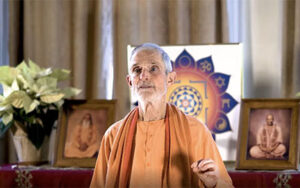
iStock photo
Viveka is the spiritual practice of discrimination—distinguishing between the real and unreal, the eternal and temporary, the Spiritual Presence and ego-identity. Here are some ways to put viveka into practice. See which of these resonates with you and supports you to be a little less identified with the mental activity that feels like you but is only the kind of mental creation that imprisons us all.
Pause periodically to step back and witness your own mind, noting the difference between all the habitual thoughts that run through the mind and the awareness of them. Can you feel into that sense of awareness—a clear, unchanging presence—and rest there?
Practice viveka especially when the mind is suffering from anxiety, grief, anger, etc. Look deeply into how and why the feeling arose to find the root cause within you instead of blaming someone else. For example, were you expecting and/or wanting something that is not coming to you? Are you identifying with a sense of lack rather than the fullness of your true nature?
When making decisions, especially important or challenging ones, open yourself to be guided. This includes a willingness to completely let go of any personal preference and willingness to listen and act guided by a Higher Will.
Refer to your mind as an object. Instead of saying, “I am going through such and such,” say, “My mind is going through this experience.” Consider yourself to be a caretaker of the mind and its ideas and tendencies.
Distinguish between the actual facts of a given situation and your interpretation of it. We often unconsciously jump to conclusions based on our past experiences
Progression in Viveka
As we progress in our ability to distinguish between the ego mind, clouded by identification with the persona we’ve constructed, and the unchanging Self, we will no doubt begin to experience a natural tranquility. We can also become more aware of that same distinction in others and in our relationship to them. Here are some ways to challenge ourselves to acknowledge the Spiritual Light in each other, that when recognized, can strengthen our ability to discriminate between the ego/mind and the Self.
When you work with someone that you find unpleasant or annoying, can you still appreciate their good qualities, support and encourage them?
Can you admit a mistake in front of a group of people or do you find yourself spinning the truth to look better in the eyes of others?
When you witness someone’s inappropriate or hurtful behavior, can you remain undisturbed? Can you take appropriate action with compassion in your heart? If action is not called for, can you still hope for them to learn and grow?
Can you acknowledge the hurt you caused to someone and ask them for forgiveness?
Can you forgive someone who hurt you?
About the Author:
 Swami Ramananda is the Executive Director of Integral Yoga Institute in San Francisco, a certified Yoga therapist, and a founding board member of the Yoga Alliance. He leads beginner, intermediate and advanced-level Yoga teacher training programs in San Francisco and teaches throughout the world. Having dedicated his life to teaching Yoga for nearly 50 years, Swami Ramananda is highly-respected senior teacher in the Integral Yoga tradition in Yoga communities worldwide. Swami Ramananda co-developed the Stress Management Teacher Training program with Swami Vidyananda, has trained many teachers to bring Yoga into corporate, hospital and medical settings, and has taught mind/body wellness programs throughout the US and abroad. He is also a co-founder of The Spiritual Action Initiative (SAI) which brings together individuals committed to working for social justice for all beings and for the care and healing of our natural world.
Swami Ramananda is the Executive Director of Integral Yoga Institute in San Francisco, a certified Yoga therapist, and a founding board member of the Yoga Alliance. He leads beginner, intermediate and advanced-level Yoga teacher training programs in San Francisco and teaches throughout the world. Having dedicated his life to teaching Yoga for nearly 50 years, Swami Ramananda is highly-respected senior teacher in the Integral Yoga tradition in Yoga communities worldwide. Swami Ramananda co-developed the Stress Management Teacher Training program with Swami Vidyananda, has trained many teachers to bring Yoga into corporate, hospital and medical settings, and has taught mind/body wellness programs throughout the US and abroad. He is also a co-founder of The Spiritual Action Initiative (SAI) which brings together individuals committed to working for social justice for all beings and for the care and healing of our natural world.

